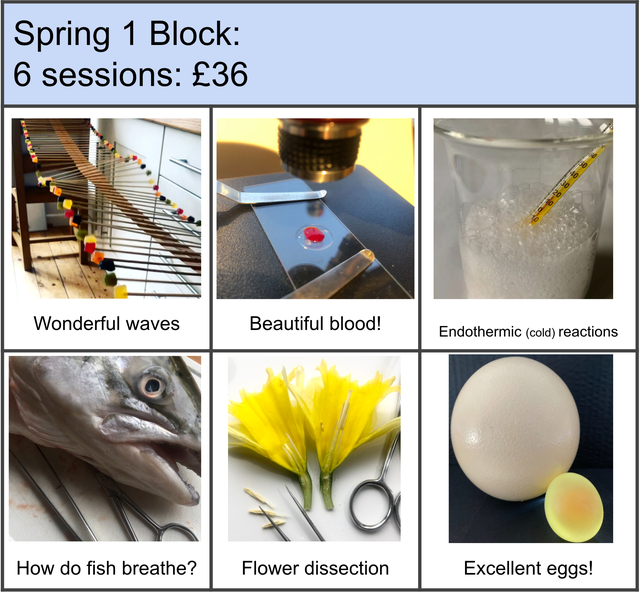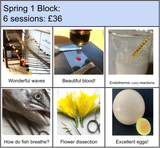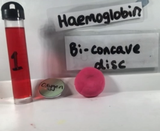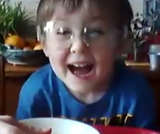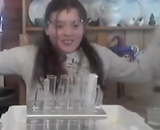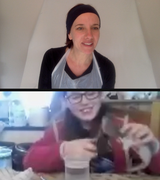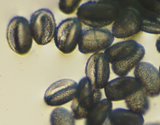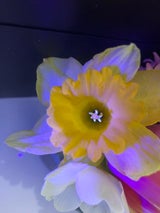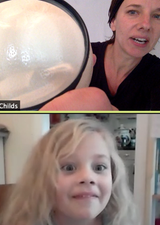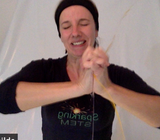- Online STEM
- >
- Spring 2
- >
- Online STEM: Spring 2: 6 sessions
Online STEM: Spring 2: 6 sessions
Wonderful waves! (21st February)
Beautiful blood! (28th February)
Endothermic (cold) reactions (7th March)
How do fish breathe? (14th March)
Flower dissection (21st March)
Excellent eggs! (28th March)
Every Tuesday:
5-8s group: 11 - 11:50am (UK GMT)
8-12s group: 1 - 1:50pm (UK GMT)
11-16s group: 2:10 - 3pm (UK GMT)
(Select from the options at the bottom).
------------------------------------------------------
Wonderful waves! (21st February)
Make your own wave model!
+ Learn about different waves types and patterns
+ Watch exciting demonstrations!
+ The older groups will also learn about various types of wave, wave patterns and wave measurements
Equipment (To join an entirely optional practical)
It is a good idea to have a whiteboard or paper, pen, ruler and calculator to hand in each session.
- A bowl of water (take care near electronics)
- A torch
- pipette / syringe / teaspoon
- ruler
- Two (full unopened) food tins
- Another two full tins or stacks of books of similar height
- Sticky tape
- Ruler
- At least 15 lolly sticks / kebab skewers or similar (take care with pointed ends), raw spaghetti also works if using soft sweets or plasticine. The sticks all need to be the same.
- Plasticine (ideally pre-rolled into 30 equal, marble-sized balls) or about 30 sweets such as “midget gems / “jelly babies” (these can be reused or eaten later!) If using lolly sticks, plasticine or similar works better than sweets.
What might younger students need help with?
Younger students may need help rolling plasticine into balls and taking care with pointed ends of skewers.
------------------------------------------------------
Beautiful blood! (28th February)
What is blood made of and what does it do?
+ Examine real blood through a microscope!
+ Make a model of the blood and its components
+Learn about the structure and function of the components of blood
+ The older groups will also learn about some specialised cells, diffusion and how to prepare a blood smear slide for microscopy
Equipment (To join an entirely optional practical)
It is a good idea to have a whiteboard or paper, pen, ruler and calculator to hand in each session.
- Transparent jar / small bottle / test tube + lid / bung (ideally leakproof)
- Water (take care near electronics)
- Yellow food colouring or ink (not paint, needs to be transparent)
- A strand of dried spaghetti (or similar)
- Ruler
- Blue tak / modelling clay or similar (red if possible)
- Small white beads / polystyrene balls / “white tak”
- Pencil
- Measuring jug or cup
- Have a cloth to hand for spills
What might younger students need help with?
Younger students may need help with the lids of jars / containers, pouring liquids and food colouring and avoiding / clearing any spills. Take care with water near electronics.
------------------------------------------------------
Endothermic (cold) reactions (7th March)
Feel the cold as you conduct your own endothermic reaction at home and make bath bombs!
+ Watch exciting demonstrations!
+ The older groups will also learn about reaction profiles and the different energy levels of an endothermic chemical reaction.
Equipment (To join an entirely optional practical.
It is a good idea to have a whiteboard or paper, pen, ruler and calculator to hand in each session.
- Vinegar (any kind, min. 100mL) (avoid contact with eyes)
- Bicarbonate of soda (Min. 150g)
- Citric acid (min. 50g)
- Test tubes / boiling tubes / jars / small glasses, beakers or conical flasks
- Tray / plate to contain spills
- Thermometer if you have one (not essential)
- Cup cake cases, or silicon moulds
- Mixing bowl
- A few small bowls or saucers
- Mixing / desert spoon
- 2 teaspoons
- Pipettes / droppers / syringes
- Eye protection recommended
- (optional) Food colouring
- Optional: A few drops of essential oil eg. lavender, citrus or zest of a lemon or orange
- Optional: A (ready made) bath bomb and bowl of water
- Cloth / dustpan or brush for clear up
Links offer suggested sources of suitable materials.
What might younger students need help with?
Young students may need support to avoid / clean spills.
------------------------------------------------------
How do fish breathe? (14th March)
Discover how gills help a fish to breathe!
+ Watch a dissection of a fish's gills and join in with your own at home, if you want to!
+ The older groups will also learn about surface area and diffusion
Equipment (To join an entirely optional practical)
It is a good idea to have a whiteboard or paper, pen, ruler and calculator to hand in each session.
- Several pipe cleaners
- 2 Beakers, glasses, or jars of water (take care near electronics)
- a funnel (or the cut off top of a plastic bottle would also work)
- Glitter (if none available, a piece of tin foil and scissors might do)
- A cloth for spills
For those who wish to do their own dissection at home:
- Fresh fish head
- Tray
- Sharp scissors (take care with sharps, supervision recommended)
- Soap & warm water for thorough hand washing afterwards
Links suggest sources of appropriate resources
What might younger students need help with?
If doing the dissection at home, supervision is strongly recommended with younger children. They may need help handling a slippery fish and using sharp scissors. Some children may need support and preparation to view a live dissection on screen.
------------------------------------------------------
Flower dissection (21st March)
Learn about the structures within a flower and what they do!
+ Watch and carry out a careful dissection of a flower, look at pollen under a microscope and create a decorative and informative record of your dissection!
+ See a bee's perspective of flowers!
+ The older groups will learn about the structures and their functions in greater depth
Equipment (To join an entirely optional practical)
It is a good idea to have a whiteboard or paper, pen, ruler and calculator to hand in each session.
- Tray / plate / chopping board, ideally white
- A whole flower (flowering, not budding), ideally a daffodil + spares if possible (those with pollen allergies may wish to take appropriate precautions)
- Pen paper / whiteboard and pen
- Ruler
- Sharp scissors and / or knife (take care with sharps)
- Forceps or tweezers would be helpful
- Optional: A piece of white card or paper, pen and glue stick - If you would like to make a decorative and informative record of your dissection.
Links suggest sources of suitable resources
What might younger students need help with?
Younger students may need help with careful handling of scissors and laying out their flower gently.
------------------------------------------------------
Excellent eggs! (28th March)
What's inside an egg and why is it shaped that way?
+ See a range of weird and wonderful eggs!
+ find out just how strong eggs are... or aren't!
+ Watch amazing demonstrations!
+ The older groups will also learn about protein structure and the chemistry of egg shells
Equipment (To join an entirely optional practical)
It is a good idea to have a whiteboard or paper, pen, ruler and calculator to hand in each session.
- A tray or table cloth (to contain any mess)
- Four eggs of the same size (hopefully three will still be edible afterwards)!
- 6 identical plastic bottle tops (the sort you get on squash bottles are ideal)
- a protective sheet of some sort A4 size (a silicone baking sheet, plastic document wallet or similar)
- An A4 hardback book
- At least 10 other books (supervision may be required to ensure these don't tumble onto anything / anyone)!
- A large glass, beaker or jar (ideally should fit an egg neatly in the bottom)
- Approx. 300mL vinegar (cheap "white" vinegar for cleaning is perfect, but any will do)
- Eye protection is recommended to prevent vinegar splashing in eyes.
Links suggest sources of appropriate resources
What might younger students need help with?
Supervision of young children is recommended to help them pile up books carefully!
They may need help if any eggs break, and with pouring vinegar carefully.
------------------------------------------------------
Price is for one device (screen) to join for six sessions.
Upon booking you will receive a photography consent form and opportunity to let us know about any Special Educational Needs and Disabilities (SEND).
By booking you are agreeing to read and abide by the Privacy policy, safety and cancellation policies (Opens in a separate window).
